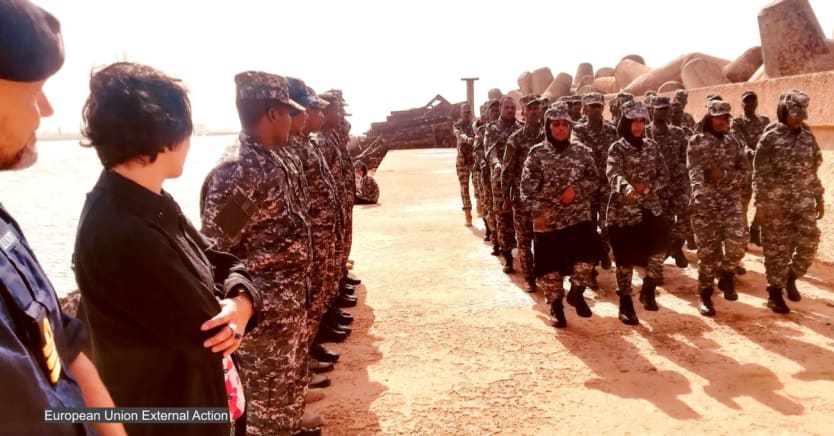
The Sahel region and Somalia, but also Mozambique, Ukraine, Georgia, and the Libyan coast guard, are among the theaters being considered for support under a new European Union tool to send potentially lethal military equipment to countries around the world.
EU foreign ministers approved the European Peace Facility, worth €5 billion ($5.9 billion) over seven years, earlier this week. For the European External Action Service, or EEAS, the EU’s foreign service, this means that “Finally, the EU will have the possibility to provide military equipment to increase partners’ defence capabilities … [enabling] capacity-building activities for military actors, and the provision of training, equipment and infrastructure for security purposes.”
But Julien Vaissier, conflict and humanitarian adviser at Oxfam’s EU office, argued in a press release that the facility lacks “robust controls” and “could make it easier for local militia and armed groups to get their hands on weapons, causing only more instability and suffering.”
The text for the facility, published Wednesday, foresees safeguards and risk assessments, and it outlines when assistance may be suspended or terminated, such as when EU states are not satisfied that those receiving the equipment — which may include guns and ammunition — can adequately trace it.
Member states are now exchanging ideas on how to use the facility before the first measures are adopted in the coming months. One “food for thought paper” from Germany, the Netherlands, France, Spain, Italy, Belgium, and the Czech Republic, obtained by Devex, outlines their expectations, including where they think the EPF should be used first.
“[The European Peace Facility] could make it easier for local militia and armed groups to get their hands on weapons, causing only more instability and suffering.”
— Julien Vaissier, conflict and humanitarian adviser, Oxfam’s EU office“The implementation of capacity building measures in conjunction with EU military missions and operations, where access to military leadership is already given and mutual trust has been established, provides a good starting point for a first successful project cycle,” the paper states.
“Our clear priority for capacity building in 2021 lies on supporting efforts of the EU and Member States to restore security in the Sahel region. … Moreover, and in the framework of our strategic interest in stability and security in the Horn of Africa, we also suggest capacity building measures together with [the EU Training Mission in Somalia].”
Giuseppe Famà, head of EU affairs at the International Crisis Group, told Devex that the paper — which also refers to possible support in Libya, the Gulf of Guinea, Mozambique, Ukraine, Moldova, Georgia, and Bosnia-Herzegovina — would carry significant weight, given the influence of the states behind it. “Even if the EEAS may have a more or less nuanced position, you can expect those items to be taken forward” by member states, Famà said.
An EEAS spokesperson told Devex it was “too early” to comment on what assistance could be provided under the EPF, as member states’ discussions are ongoing.
On Libya, the paper states that “Depending on further political developments in Libya, the EPF could in the future support training of the Libyan Coast Guard as a mandated task of EUNAVFOR Med Irini through the supply of relevant equipment.”
Members of the European Parliament and NGOs have long deplored EU funding in Libya, citing concerns over the human rights of refugees and migrants trying to reach Europe.
EU aid embraces single instrument theory
The European Union has allocated €79.5 billion ($94.5 billion) over the next seven years to pursue its interests around the world, tackle poverty, and help its neighbors prosper.
One EU member state source not involved in the preparation of the paper, who spoke on condition of anonymity, told Devex that “we will not be providing lethal equipment to the [Libyan coast guard].” The source noted the EU is already providing training for the coast guard, as well as help with boat repair and telecommunications gear, and said: “We will only consider the possibility of providing other equipment if we assess the situation would allow [it] and safeguards are put in place. But right now, I would say that that is not even being discussed.”
The paper reiterates that EPF proposals will include conflict sensitivity and context analysis, an assessment of risk and impact, and “appropriate safeguards, controls and mitigating measures.”
The seven member states also note the geopolitical importance of the EPF. “In line with EU Member States’ shared values and interests, measures are to improve the EU’s ability to quickly adapt to evolving situations in order to prevent conflicts and build peace,” the paper states. “The EU thereby becomes a more active player and preferred partner in a field where third actors, who do not necessarily share our common principles and values, have already shown their willingness to step in.”


